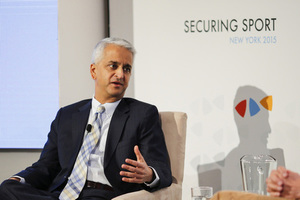By Paul Nicholson in New York
November 5 – The pay equity issue between men and women’s football could be solved by making the women’s game a much bigger business, said Sunil Gulati, president of the US Soccer Federations (USSF) and a FIFA executive committee member.
Interviewed by US political commentator James Carville at the Securing Sport 2015 conference in New York, Gulati said that there needed to be more women representation in the higher levels of the administration of the sport and that generally in the women’s game the US has been a leader.
The debate over pay equity ignited at the Women’s World Cup this year in Canada where the US women’s team won $2 million for becoming world champions, compared to the $35 million won by the German men in Brazil in 2014.
“We all understand the years of discussion regarding women and this issue. The US has been leaders in getting resources to the grassroots to allow participation,” said Gulati. “Title 9 helped get to the source of the problem which is participation. More resources were key,” said Gulati.
But he also said that more women need to make it up the administration ladder. “There needs to be more representation in the leadership. 30% (female) participation in the corporate boardroom changes the dynamic for the better,” he said.
The numbers of females in top positions at FIFA is nowhere near that level, though Gulati said it is better in the USSF. In looking for solutions to the pay equity issue, Gulati said there is a “need to make it a bigger business”. In the US women’s football already is a big business with 40-45% of registered players in the US girls.
Carville missed a major opportunity with a currently press shy Gulati to really question an insider on what is happening within the crisis-hit FIFA organisation and the reforming CONCACAF, and where his current thinking was as regards to the upcoming FIFA presidential elections.
As regards FIFA, Gulati did say that while “the last five months have been a very difficult period, the game itself goes on very successfully…the institutions have difficulty and we have endangered everything. Even other sports are telling us we need to straighten this out as it is impacting on them.”
Asked about the relationship between politics and sport which FIFA maintains must be kept separate, Gulati said that “to believe politics doesn’t have a role is absolutely nonsensical…the intersection between sports and politics is absolutely there. You can’t think about putting on a major event without government.” But he did say that he was “not sure the requests made of government were entirely realistic.”
On FIFA transparency Gulati’s response was that “we’re working on it”. Referring to World Cup bidding he said that there need to be tighter rules, more transparency in the vote (FIFA World Cups will now be voted on by the entire 209 member congress), “and technical standards that actually mean something.”
It was a lack of transparency and suspected corruption within the World Cup bidding process that ignited the integrity crisis within FIFA.
Contact the writer of this story at moc.l1745294713labto1745294713ofdlr1745294713owedi1745294713sni@n1745294713osloh1745294713cin.l1745294713uap1745294713

